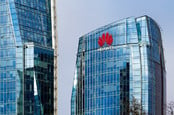This article is more than 1 year old
UK, Canada could rethink the whole 'ban Huawei' thing post-Trump, whispers Huawei
Veep needles British government: Without us, you'll 'widen the north-south digital divide'
Analysis Huawei isn’t waiting for Donald Trump to concede, or, in fact, even leave the White House, before flexing its muscles again.
The Chinese mega-corp has been a frequent target of the US President, blocked and banned, bad-mouthed and beaten. Its CFO was even arrested in Canada, and is fighting extradition to America. But with Trump on his way out, the manufacturer is fighting back hard.
In the UK, Huawei is pushing the British government to revisit a decision to ban Huawei's components from its networks, particularly upcoming 5G networks – a decision that was largely driven by pressure from the Trump administration, something that ministers openly acknowledged.
With that pressure lifting, Huawei’s executives have claimed that cutting it out of mobile networks will not only massively increase the cost of building them (Huawei’s products are cheaper than rival European and American equipment) but will delay the rollout of 5G networks, possibly by several years.
Northern soul
Huawei VP Victor Zhang even gave an interview to The Guardian to push the point. “The decision is going to have a huge economic impact on the UK,” Zhang said.
“The UK wants to see a balance of investment between London, the south-east, the Midlands and the north of England. World-class connectivity is crucial to this objective, and without that it is very difficult to close the gap in the economic imbalance in the UK.”

Qualcomm gets hall pass from Uncle Sam to supply Huawei with mobile chipsets. There's just one catch: It's for 4G only
READ MOREThe reference to areas outside London seems intended to add political pressure on Downing Street, which has recently been at the end of significant ire from the north of the country over pandemic restrictions and London-centric decision-making.
Zhang then pokes that with a stick. “The research shows it will widen the north-south digital divide. In the north, the broadband carriage and speeds are already far behind London and the south-east,” he said. “The delay in developing 5G will worsen the situation. The government is committed to superfast broadband by 2025, and with this decision the objective of leveling up becomes unachievable.”
It’s a strategy that could well work: after initial heavy pressure by the US claiming national security risks, the UK held a review, and decided that Huawei’s equipment could be used in its general 5G coverage but should be kept outside sensitive areas.
That decision was then simply overturned by the Prime Minister’s office, in large part because it was desperate to get a trade deal with the US in order to balance the effect of a possible no-deal with Europe over Brexit. The Trump administration used a Huawei ban as a bargaining chip and won the U-turn. But those US officials will be out of power in two months, at this rate, and the economic arguments will swing back in Huawei’s favor.
Cha-Ching
And in Canada, the extradition hearing of Huawei CFO has also taken an unexpected turn. Meng Wanzhou was arrested in Vancouver two years ago after US authorities issued a warrant and pressed the Canadian authorities to grab her. The US claims she committed bank fraud by causing HSBC to break Iranian sanctions.
Meng says she is innocent but, regardless, her arrest was seen as just one more tactic by the Trump administration to put pressure on Huawei and, by extension, the Chinese government with whom the President is engaged in an extensive and deadlocked trade war.
The extradition hearing has largely focused on what Meng’s lawyers claim were process abuses and unusual coordination between the US and Canada. The hearings are unlikely to end before the Trump administration ends in January, and there appears to be a re-evaluation going on.
On Monday, the court unexpectedly heard that one of the key witnesses for the US government’s extradition case, a Canadian police officer, decided not to testify after all. Officer Ben Chang inappropriately sent details of Meng’s electronic devices to the FBI, her lawyers allege, which is something he has denied. We're told that after Chang consulted with his own lawyer, he decided not to testify. It opens a hole in the extradition case that Huawei is certain to exploit.
In other words, few people are celebrating Trump’s loss more than Huawei executives. ®
